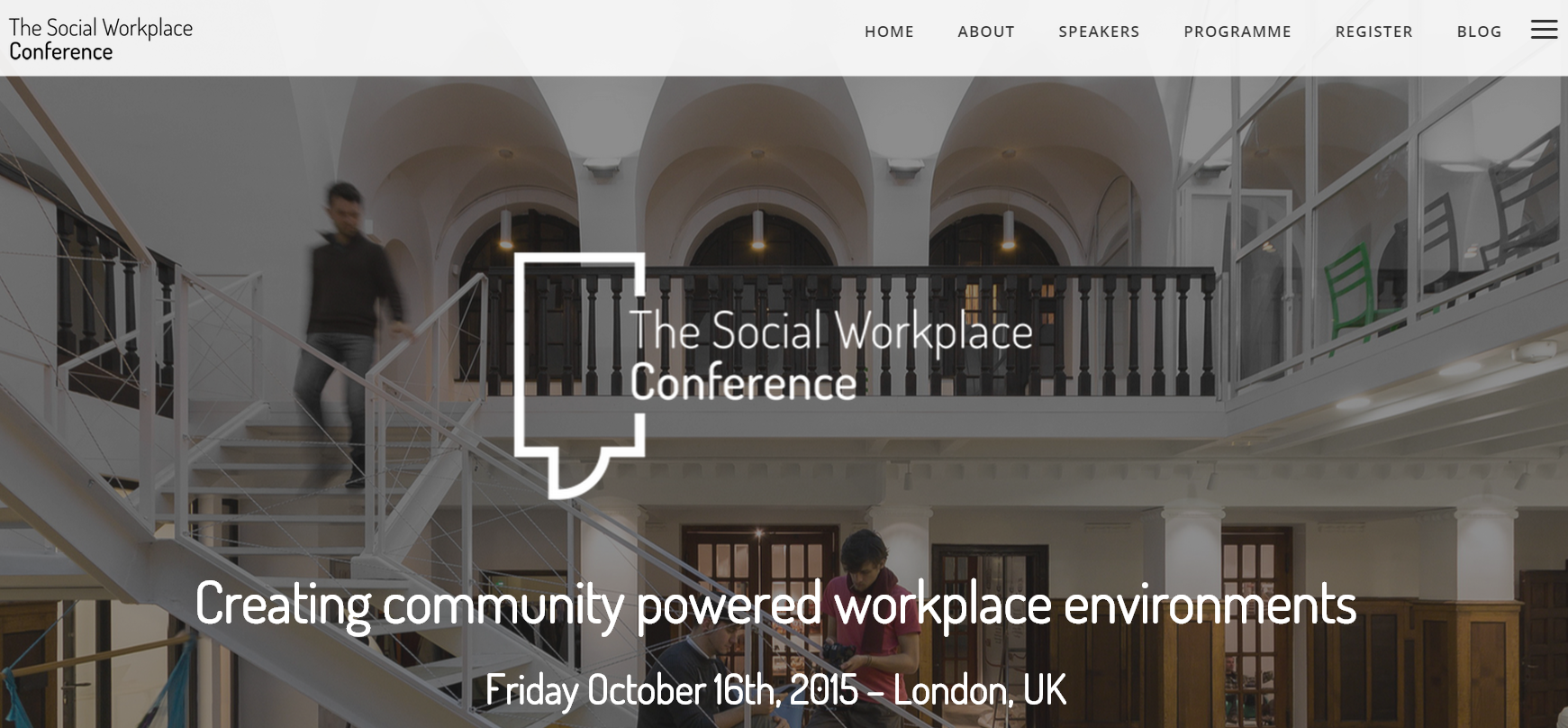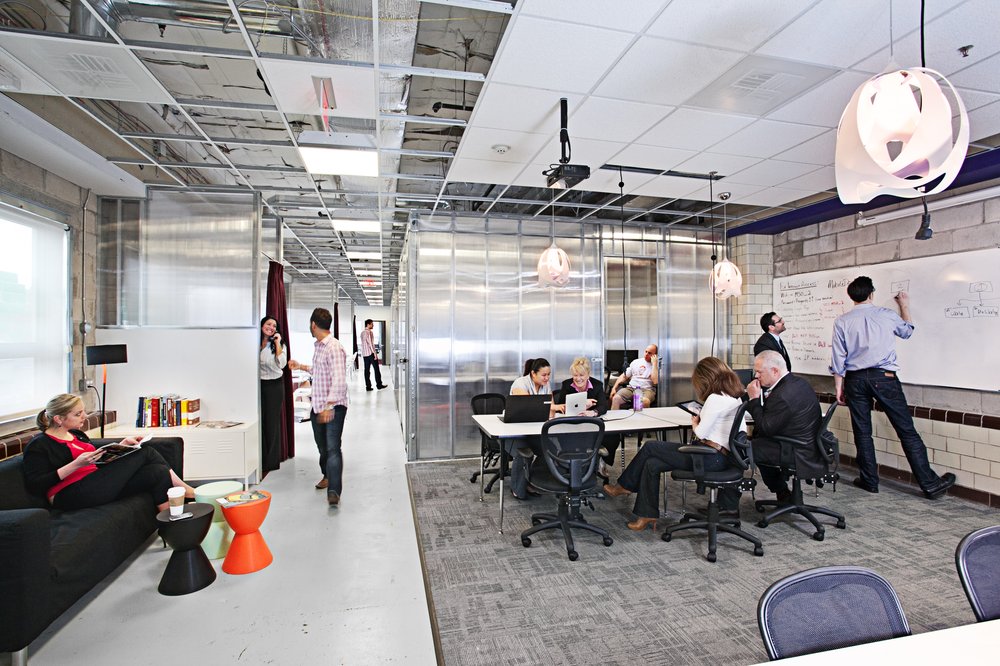Can companies implement the coworking model?
In recent years, the coworking movement has broadened; there are more and more spaces, which reach an increasingly wider community and have attracted investments of around $1bn in the last year. This has undoubtedly helped the concept be progressively more "in trend" and the number of medium-sized and large companies interested in the ins and outs of the model is on the rise. As a result, there are also more events and training programmes aimed at promoting collaboration in professional working environments. Since 2011, Unwired has hosted the Worktech conference on the future of work, spaces, technology and innovation. The event has been held in cities all over the world and the next one will take place in Singapore in September. London is also going to be host to the first edition of “The Social Workplace Conference” organised by Global Enterprise, the consulting firm behind Coworking Europe.

Photo source: The Social Workplace Conference website
How can medium-sized and large companies benefit from the virtues of coworking? Can the coworking model be extrapolated to these organisations? Let's look at two situations or models:
1.- Companies that use spaces' infrastructure
The number of companies that allow their employees to work remotely or teams that are spread across the world is on the increase. Buffer is a great example of one of these teams, with 31 people in 22 different countries at present. Joel Gascoigne (CEO) explains the advantages and disadvantages of working with this company model. The norm is that these teams turn to coworking spaces for a base outside of their homes. There are several advantages for this type of model:
- Productivity: Although we shouldn't generalise, we are faced with so many distractions when we work from home. A coworking space offers a professional environment.
- Reduced costs: Companies can reduce their investment in offices by combining working remotely with using work spaces as and when they're needed.
- Interaction: Coworking spaces are diverse and open. The collisions that occur are positive for a project's development.
- Flexibility: Sometimes companies may be put off by their remote team sharing a space due to privacy and confidentiality issues. However, more and more spaces are offering private offices. Spaces like Indiegrove, Mission50 and The Working Capitol all combine private offices for teams and other more flexible models.

- Horizontality: A coworking space mainly hosts independent professionals or small companies. This means that there are no hierarchical relationships, which can exist in some large companies, like Facebook or Twitter.
- Bootstrapping: Many coworking spaces get their own community involved in the space's design and construction (ideas, assembly, etc.). This really helps develop a sense of belonging and identity.
- Diversity: While the main motto in large companies is unambiguous and corresponds to the organisation's macro-vision, we can find several projects, interests and various "mottos" in a coworking space.
Related stories
Why a CRM is Essential for Coworking Spaces (And How to Choose the Best One)
A customer relationship management platform (CRM for short) is what organisations use to manage relationships and interactions with both existing and potential customers. Its primary function is to streamline operations and communications to ensure a smooth customer - and employee - experience, while improving profitability.
Global Coworking Trends and Opportunities for 2025
Now well into 2025, the coworking industry continues to demonstrate strong momentum. With demand for coworking spaces remaining steady around the globe, it's clear that coworking is not just enduring—it's thriving. Let’s explore the major trends and opportunities shaping the global coworking landscape this year.
Creating Events that Drive Community Engagement in Coworking Spaces
Community is everything in coworking, but a genuine sense of connection between members doesn’t magically happen overnight or by chance. Often, meaningful relationships take intentionality, effort, and time to build, with events being an effective vehicle for bringing people together around shared interests, goals, and experiences, creating opportunities for collaboration, and a thriving coworking culture. This article looks at creating events that drive community engagement in coworking spaces.
How the Right Coworking Software Can Transform Your Coworking Space
We all know that technology solutions are imperative to the day-to-day running of your coworking space, but the right coworking software can take it to the next level. It has the power to transform your coworking space into a highly profitable business, all while building a vibrant and engaged community. Let’s explore how the right tools can transform your coworking space.
How to Make Your Coworking Space More Sustainable in 2025
Sustainability is becoming more and more important for coworking spaces. If you're thinking of making your space more sustainable, it's good to remember that there are lots of ways to go about it. From small details to bigger changes, everything adds up when it comes to reducing your environmental impact.
Is Hot Desking Right for Your Business? Pros & Cons of Flexible Workspaces
Hot desking has become one of the go-to solutions for businesses seeking flexibility and cost efficiency. It supports hybrid working models, boosts collaboration and reduces office overheads. But hot desking isn’t right for everyone.
5 Ways to Reduce Noise in Open Offices & Coworking Spaces
Some people like working against a background of noise, while for others it’s their worst work nightmare. The truth is, our relationship with noise depends on our own preferences and the nature of our work.
ViDA Compliance Guide: 8 Essential Steps for Coworking Spaces in the EU
Now that 2025 has arrived, the European Union's VAT in the Digital Age (ViDA) initiative is becoming a key topic for coworking spaces operating in the EU. But don’t panic—ViDA will be introduced gradually, with key changes taking effect from 2028. This major VAT reform aims to modernize tax reporting, combat fraud, and streamline compliance through mandatory e-invoicing and real-time digital VAT reporting for certain transactions.
Harnessing AI to Help Coworking Operators Understand Their Communities Better
After more than twelve years in the coworking industry, we’ve seen the movement evolve at an incredible pace, especially in recent years. Spaces have grown larger, making it harder for operators to truly connect with their communities. At the same time, expectations for higher service standards and increasing competition mean that creating tailored experiences and fostering long-term member engagement is more important than ever.
What Is Workplace Management and Why Does It Matter?
There has always been a need for workplace management – the process of organising and optimising physical spaces, resources, and operations to support people’s needs. But, as 28% of UK working adults were reported to work in a hybrid capacity last autumn (by the Office for National Statistics), the question of ‘why workplace management matters’ is more critical than ever. Let’s look at the workplace management benefits for your operations.

